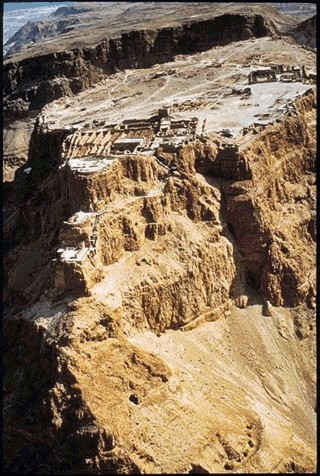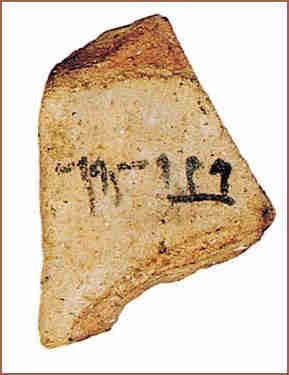|
Visiting Masada
By Jacqueline Schaalje
It is difficult not to use superlatives in describing Masada. Think of a huge rock and Masada will be bigger and steeper. Think of an historic place, and Masada will even have more historic memories than you would expect.
Masada was initially built by King Herod the Great (37-4 BCE). He built a great deal in Israel, and a lot of his buildings still stand strong, although of his most famous one, the Temple in Jerusalem, only the Western Wall remains. Herod's buildings all have one thing in common. They were really majestic.
Thus it is also in Masada. For this megalomaniac king, a positivist of the kind who "thinks big", even the desert around the Dead Sea was a playground. In the middle of the biblical landscape, on a steep rock where most normal people would feel themselves very small, he built his holiday resort.
Little would Herod expect that his luxury spa would one day become Israel's most celebrated site by Zionists, where Jews in the first Century BC died as martyrs. Although a bit of tragedy and even murdering were not alien to Herod at all (he killed almost all of his close family and plenty of religious Jews who were against his government). Herod did not only use the place to enjoy the healthy Dead Sea minerals, but he was of course aware of the great natural defence of the mountain. Plenty of times it served as a safe haven against enemies, for himself and his family (when he still had one).
Herod's buildings are dominant at the site. In the west lies the Western Palace, which has a mosaic floor in a geometric pattern. Although there exists more famous mosaics from Roman times, the Masada mosaics have a nice touch because they are still in their original place. When you walk over them (on a wooden board a few meters up) the biggest mosaic has a stain on it. This looks charming actually, as a favourite book upon which coffee has spilled over it.
A bit further down from the palace is a swimming pool. Although these are not a Jewish invention, but were imported from the Hellenistic world, baths are very biblical. The elegantly cut oval basin conjures up images of famous bathing seductresses from the bible: the wife of Potiphar who tried to entice Joseph, and the woman whose name sounds like a bath in itself, and who had more success with David: Bathseba.
Herod's most famous palace is the one on the north tip. Like the gardens of Babylon it balances in 3 steep terraces down the rock. There are some beautiful marble columns and frescoes left of the original structure. The terraces give a view of the Dead Sea and the desert on the left side, and also show why Herod chose this place as his last stronghold: like all cars driving from En Gedi to Eilat may be seen from the mountain, so Herod could detect visitors from miles.

An important point on Masada was the water supply. On a few places there are deep water cisterns which assembled the rain water. Herod had a chance to see if they were working when, during an invasion of the Parthians, he sheltered his wife, mother and sisters on the mountain. While the mountain was sieged by rival king Antigonus, "Herod's" women held out during the summer.
About the storage of food, less is known. There are huge storehouses, but these were also used for weapons and military supplies. There is not a single tree or trace of a garden on the rock, so the food of Herod and his household cannot have been that varied.
In any case, after Herod's death in 4 BCE Masada became more of a military camp. It was first taken over by the Romans in 6 CE. In 66 the Jewish rebels of the First Jewish War, which started in the same year, captured the mountain. It became subsequently a stronghold of Zealots. These were the most important group of rebels during the war. "Zealot" comes from "zealous", meaning fanatic.
Like many religious groups from their time, the Zealots believed in a Messiah. However their messiah had a political role. An ascendant from the house of David, the Messiah, would take over the kingship of Israel like in ancient times. However after 6 BCE the Romans were ruling the country. The Zealots, in their efforts to restore the just kingship, started the First Jewish War against the Roman domination. One by one fortresses throughout the country fell to their rebellion. Other Jewish groups, like the Pharisees and Sadducees, joined them, although the Zealots did most of the fighting. They also conquered Jerusalem.
The tragic story which followed is well known: how the Jews had to give up again against the overwhelming power of the Romans, once the Romans had recovered from the initial surprise of the Jewish upsurge. In 70 Jerusalem fell and the Temple was burnt and looted. All other forts and strongholds had been taken back into Roman hands.
Except for one: Masada. Taking control of the mountain was not urgent; as the Zealots on it only raided nearby places they did not form a direct threat to the Romans. Also because of its known impregnability no Roman general wanted to stain his hands with a possible defeat in trying to conquer it.
In 74 after the actual war was long over, Masada was finally besieged by Flavius Silva. He started the siege by putting 8 military camps around the mountain, exactly according to the Roman military textbook. Some of the camps may still be found and are seen from the mountain. 10,000 Roman soldiers were present.
However setting up camp and waiting until the beleaguered would give up the resistance from hunger and thirst did not work fast on Masada, because of the wealth of resources. Soon, therefore, Silva ordered building a huge ramp against the western slope, which is still an impressive sight today. The ramp supported a platform with a tower, heavy ballistas (catapults) and a battering-ram. Against this the defending Zealots held out, even after their wall around the mountain was destroyed. The new wall, which the rebels built quickly, was made of wood, and when it caught fire at nightfall the rebels knew that their end had come.
The story is told by Josephus (The Jewish War), who is the only source for all of the history of Masada. According to him, after the fire had destroyed the wooden wall, the Romans went back to their camp to sleep. During this the leader of the rebels on Masada held a long speech. The message of the speech was that the fall of Masada was a punishment from God against the sinfulness of the Jewish nation, who had allowed Roman rule to take over. Therefore the rebels should not receive their punishment from the Romans, but from God himself. They would commit suicide.
A thousand people, including women and children, were killed by their husbands and fathers. The last 10 men drew lots who should kill the last nine, and the last one killed himself. Of course there is not anyone who does not want to believe this story, one of the highlights of the Jewish heroic past. However there are some problems with the account, as pointed out in recent years.
First of all: what is known as the biggest collective suicide in history was actually not a suicide at all, but a collective murder. If Josephus' story is true, only one man committed suicide. This could be historical, though, because suicide does not occur in Jewish history: it was taboo. Although many Jewish rebels were killed in conflicts, not only during the Jewish wars, they were always executed, and never killed themselves voluntarily.
Another strange thing is that of the hundreds of skeletons which must have remained on Masada only 25 were found. They could have been removed, but then it is unexplained why the last 25 were "forgotten." According to Josephus, the Romans found an awful silence when they returned to the mountain the next morning after the fire. They found 2 women and 5 children alive who had hidden in a cistern, and who told the Romans what happened.
The sceptics say that it was extremely unlikely that the Romans would have waited one whole night before they stormed the mountain. In all known sources about Roman sieges, they immediately finished the job after having achieved a breakthrough. the traces of more than one fire have been found on the walls, not only the one fire according to Josephus. On the other hand the fires could also have been lighted by the rebels, just before they chose to kill themselves. Josephus also errs in some other details, about the palace for example.
Unfortunately we cannot check the story against Roman sources, because the siege is not recorded by them. Many now believe that the story was partly true. Some rebels would have killed their families, while others probably fought to death or until they were arrested by the Romans. This was usual with the other rebellions against the Romans in the rest of the country. It makes the story not less heroic.

Another small detail is unexplained. Near to the Northern palace 11 pottery shards were found with names written on it in Hebrew. One name, Ben Yair, seems to correspond to the name of the leader of the rebels in Masada, Eleazar ben Yair. According to archaeologists we cannot assume that these are the lots of the last 10 men from the Josephus story. But what is against believing it, after all?
The rebels did not build much on Masada after their settlement, and besides a beautiful story they left some miscellaneous objects. They used the buildings that Herod had constructed, including his synagogue. This intimate square place is in the north-west corner. It is plastered white and has four benches against each wall. It is one of the oldest known synagogues in Israel, and the best preserved. In it parts of 2 bible scrolls were found, and a pottery shard with the inscription "tithe for the priest."
Also they left coin herds of copper and silver shekels and other artefacts of cloth and leather which were very well preserved in the dry desert climate. After the Zealots no other inhabitants occupied Masada, except for Byzantine monks, who left a small church.
~~~~~~~
from the October/November 1999 Edition of the Jewish Magazine
|
